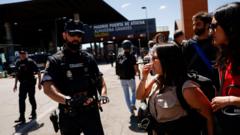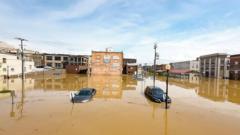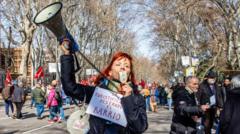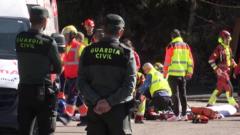A sudden power outage affected multiple regions in Spain and Portugal, triggering chaos as public transport halted, businesses closed, and residents faced uncertainty. With local communities stepping in to help, authorities worked quickly to restore power.
Power Outage Mayhem: How a Massive Blackout Impacted Spain and Portugal

Power Outage Mayhem: How a Massive Blackout Impacted Spain and Portugal
A severe power cut disrupted daily life across Spain and Portugal, leaving travelers stranded and citizens scrambling for basic necessities.
On a seemingly ordinary day, a sudden power outage struck Spain and Portugal around midday local time, cascading into a crisis that connected citizens across the Iberian Peninsula. Light turned into darkness as train journeys were interrupted, businesses ceased operations, and panic surged, leaving people stranded and confused.
Peter Hughes, traveling to Madrid, became aware something was off as his train started to slow, eventually halting 200 kilometers outside the capital. With no functional toilets and emergency lights flickering, he shared his anxiety about the impending darkness. "It will be getting dark soon, and we could be stuck here for hours," he lamented.
As the blackout created chaos, electric outages were felt as far as Andorra and parts of France, impacting everyday life. Traffic lights failed, metros came to a standstill, and long queues formed outside ATMs as card payments were rendered useless. Many people, like Jonathan Emery, found themselves stuck on trains. Huddled halfway between Seville and Madrid, passengers worked together to pry doors open for ventilation and survived thanks to the kindness of local villagers bringing supplies.
On the ground, supermarkets experienced a sudden halt of operations. Hannah Lowney, who was shopping at Aldi in Madrid when the power went out, noticed people leaving their offices with uncertainty enveloping the city. "It's a bit disconcerting that it's the whole country; I've never experienced this before," she said, mirroring the anxious sentiment permeating the atmosphere.
In Lisbon, the situation was no less disruptive. Emily Thorowgood, a teacher, shared her experience at an international school where she had to continue instructing her class in darkness. Meanwhile, residents found themselves navigating a city with no traffic signals while gathering to discuss the unfolding crisis. Weaving through chaotic streets, Will David interestingly described the unusual sights – a world seemingly disconnected from its usual flow.
As mobile networks began to falter, citizens faced additional challenges in trying to communicate and gather information. Curtis Gladden, located near Valencia, expressed alarm about the lack of updates. "It's scary," he mentioned, resonating with many grappling to stay informed. Simultaneously, concerns regarding access to clean water and food loomed large as people took to the streets searching for resources.
With the clock ticking, Madrid's mayor advised residents to stay put as authorities worked to assess the situation. In a coordinated effort, Spain's Prime Minister convened the national security council while power grid operators projected varying timelines for restoration. While areas began to see power return, Portugal’s REN warned that full recovery could take up to a week.
As vendors hustled to offer food and drinks – powered only by temporary reserves – tourists and locals alike grappled with uncertainty about their next steps. Tom McGilloway, due to return to London, highlighted the difficulties ahead. "If I need to book a hotel if the plane is cancelled, I don't know how I can do it if payments are down," he stated, capturing the frustration felt across the region.
This unforeseen blackout transformed ordinary routines into tales of resilience and community solidarity, highlighting the fragility of modern infrastructure amidst uncertainty. As recovery efforts continued, locals found reassurance in their ability to support one another in the face of chaos.






















